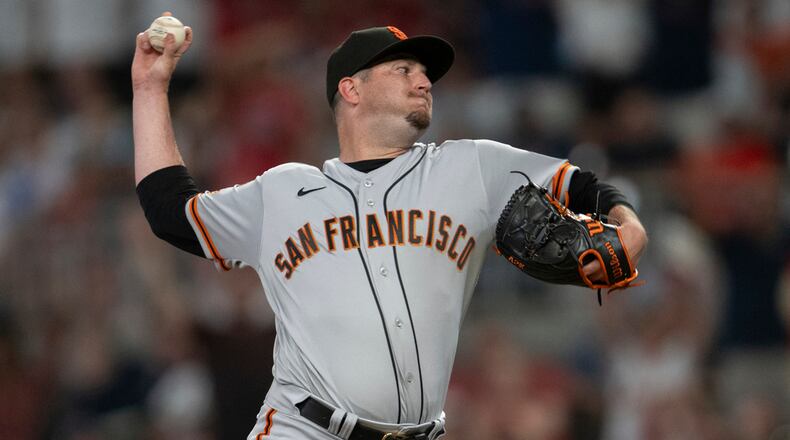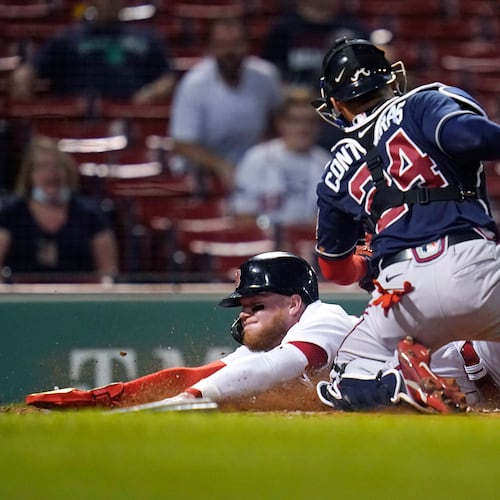Luke Jackson considers himself to be close with Alex Anthopoulos.
“He’s fired me (three) times, he’s hired me a couple,” said Jackson, referencing Anthopoulos designating him for assignment three times. “We talk a lot. He’s a good friend, he really is. Very honest man, truthful.”
Last offseason, Jackson and Anthopoulos remained in communication. Jackson was a free agent still in the middle of his Tommy John surgery rehab. Anthopoulos, the Braves’ president of baseball operations, was hard at work building the 2023 club.
Anthopoulos swung trades to acquire catcher Sean Murphy and reliever Joe Jiménez. But the Braves were not big spenders in free agency. They gave their largest guaranteed deal to outfielder Jordan Luplow, who signed for $1.4 million. Atlanta, with its core in place, decided to work around the margins.
Jackson did not fit into the Braves’ plans. In early January, he signed a two-year, $11.5 million contract with a club option for 2025 – a show of faith for someone coming off an invasive procedure.
To what extent did the Braves try to keep him?
“The Braves weren’t really going out – they didn’t really sign anybody that offseason,” Jackson said. “They made some small, minor moves. We stayed in touch and we were trying to work out a deal. But I tried, I tried. I live here, so it would have been easy for the family. But I took what was best. And I wanted to go to a contending team as well. If I wasn’t gonna play in Atlanta, I want to play against Atlanta. San Fran came, they really wanted me and (Giants president of baseball operations) Farhan (Zaidi) was like, ‘Hey, this is gonna be a good fit for you.’ And it’s been a great fit, honestly. It’s been awesome.”
But over a conversation that lasted almost 25 minutes, Jackson fondly reflected on his Braves tenure. The 2021 World Series. The culture. The people. Atlanta became home for Jackson, who still lives eight minutes north of the ballpark.
Given all of that, how did he overcome potential feelings of hurt at the Braves’ decision not to pay to keep him?
“I want to be a (general manager),” Jackson said. “That’s really what I want to do down the line after baseball. Hopefully, Lord willing, I get 10 years (of service time), and the next move is I want to be a GM. I really liked that side of baseball. I really like the business side of it.”
Last year, when he was rehabbing after surgery, Jackson spent a bit of time around some members of Atlanta’s baseball operations team. He hung around Anthopoulos and Adam Sonabend, who is the team’s director of baseball operations.
“So I get it,” Jackson said. “I understand. Like, ‘Hey, we got money, we gotta get some bullpen guys and we gotta get outfielders. We can’t give you that money.’ I understand. It’s a business, man. (Alex) doesn’t control the money. It comes from an ownership group (Liberty Media), and they’re run on margins and (return on investment) and stuff like that, which I get and I understand. You can love all the people in the world, and if you can have the face of the franchise, Freddie Freeman, and Dansby Swanson go somewhere else as well, you can let go of a reliever like it’s nothing. I have no sentiments or hard feelings. I’m excited to be here in San Fran. I really actually have loved it.”
Jackson grew up in a business-centric household. His father and brothers are in business.
Jackson, who possesses a fantastic sense of humor, thinks he would fit right in as a general manager.
“I’m a three-time fantasy football champion,” he said. “Three of five (seasons). Roster moves. I work the wire. I’m an animal in the draft.”
But seriously. He loves the draft – the real-life draft.
He knows he couldn’t scout hitting, but pitching? That would be fun.
He is fascinated with these questions: Where is value and why is it value? What separates people in those areas?
“Your money goes a lot longer when you can find value before other people,” Jackson said.
As he’s saying this, he’s almost geeking out. You can tell he’s interested in it all.
“Maybe it’s not even baseball I like,” Jackson said. “I like what makes people different and why there’s value in it. I think that’s cool. … And I like the clubhouse, that’s why I wanted it to be baseball. I love a baseball clubhouse and vibes and culture. If not, I would maybe even like doing soccer or football, whatever. Baseball is what I’ve done my whole life, so (becoming a) baseball GM would be my next endeavor.”
Asked about what he learned while observing the Braves’ front-office members, Jackson said: “The time they put in compared to us (players). They put in more time than every player involved. Not even close.”
“They’re here before we get here, they put work in when we’re not here and they’re here after the game,” Jackson said. “They travel on the road with us, they put work in in the offseason. …They work, man. And I always knew they worked, but I never knew they worked that much.”
This – the hours – is part of what it takes to build this Braves team. Or Jackson’s Giants. Like Anthopoulos, Zaidi has successfully identified and extracted value from San Francisco’s players. Certain front offices are more successful than others.
It’s not difficult to see why the Braves, or other teams, would not give Jackson a multi-year deal with the guaranteed money the Giants offered. Coming off Tommy John surgery, who knew how he might perform?
“Most teams wanted to do just a one-year deal and small money, and offer a big option year or something,” Jackson said. “Farhan was like, ‘Hey, I have faith in our training staff and our group to get you back to normal.’ I feel good. As long as I keep feeling good out there, I think it’s going to work out.”
Credit: Curtis Compton
Credit: Curtis Compton
Then there’s Brian Bannister, a coach on the staff who delves into analytics and relays numbers to players. Bannister has always rooted for and wanted Jackson. “Being just kind of an analytics-type pitcher, I don’t really wow you if you see me pitch,” Jackson said. The Giants, who seem to be adept at using analytics, know why Jackson has been successful, just like the Braves pinpointed it.
On Friday, Jackson tossed a scoreless inning against his former team in his return home. He pitched himself into trouble by issuing two walks and giving up a hit. But he struck out three batters. To Braves fans, this was the quintessential Luke Jackson appearance.
Jackson entered Saturday’s game with a 2.37 ERA over 19 innings. He returned to the mound on May 31 and pitched well until hitting the injured list with a lower back strain in July. Jackson thinks his back gave out because he was worrying about his arm more than anything else.
“And when I came back from (Tommy John surgery), it was, like, this weird sensation of, Do I know how to pitch? I don’t even know what I’m doing,” he said. “It used to happen naturally, now it’s, like, I’ve got to think about it.”
On Friday afternoon, Jackson left his home and made the short drive to Truist Park. He had to become accustomed to driving again, as he only rides a scooter in San Francisco.
“Weird,” he said of going to the visitors’ parking lot. “It was weird, I’ll be honest with you.”
He had to drive past the parking lot for Braves players and staffers to get to the visiting side. “A lot of nostalgia,” he said. He still knows the security guards, who have become good friends.
“It was emotional, a little bit,” Jackson said. “Seven years straight of every day, loving it. Fans here are unmatched. San Fran’s got some great fans, too, but no offense to San Fran, Atlanta’s a different beast when it comes to sports in general and being a hometown team.
“Friday night in Atlanta. Nothing like it, man. I don’t care. I’ve played (in) L.A. and New York City. Friday nights, Saturday nights in Atlanta – the rookies we got on our team, I was telling them, ‘This is going to be your big-league moment.’ The lights go out, standing room only, it’s loud, it’s a really good offense, a really good pitching staff. Kind of a juggernaut over there.”
Jackson is an East Coast kid. He grew up in Florida. He lives here.
On Thursday, he was talking to his wife about San Francisco.
“We adore it,” he said. “We fell in love with the city.”
Jackson admits it’s a little chilly at night. The wind blows hard at Oracle Park. But the city is charming. The Jacksons have a coffee shop below them and a pasty place above them.
San Francisco is their current chapter, but their love for Atlanta remains.
“Atlanta’s home, but it’s not where I play,” Jackson said. “I’ll forever have a piece of my heart here, but onto where my feet are.”
About the Author
Keep Reading
The Latest
Featured



